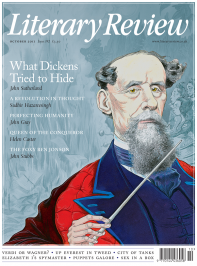Andrew Hussey
Death of the Author
The Map and the Territory
By Michel Houellebecq (Translated by Gavin Bowd)
William Heinemann 291pp £17.99
One of the most important facts about Michel Houellebecq – usually overlooked in favour of his nihilism, alleged racism and other attention-seeking provocations – is that he is a first-rate prose stylist. This is not quite enough, however, to make him a good novelist. Even some of his best novels (Atomised and Platform, for example) have clunky and unconvincing dialogue, and are packed with amateurish plot devices. His last novel, The Possibility of an Island (2005), was quite simply a mess: an artificial and histrionic tale the only redeeming feature of which was a kind of high-pitched sarcasm that quickly began to grate and was certainly never sufficient to sustain a book. The film, directed by Houellebecq himself, was even worse.
Perhaps chastened by the critical ridicule meted out to his recent works, or having simply decided to raise his game, The Map and the Territory finds Houellebecq almost back at his best. This novel was awarded the Prix Goncourt in 2010 and now, as it finally arrives in English in a finely nuanced translation by Gavin Bowd, it does not disappoint.
The Map and the Territory is part mystery thriller and part satire, set in the near-future. It presents a vision of contemporary French society as a cross between a reality show and Third World dystopia. The central conceit of the book is that France has been devastated by the latest economic crisis and the French have been reduced to tourism and agriculture for survival. This allows for some bleak but effective comedy: Houellebecq pokes fun at characters such as the television presenter Jean-Pierre Pernaut, who is unknown to English-speaking audiences, but adored and reviled in France as the avatar of the homely Gallic values of family and the land. He is described as carrying out ‘a messianic task that consisted of guiding the terrorised and stressed viewer towards the idyllic regions of a protected countryside’ – a kind of Alain Titchmarsh with a touch of pétainisme. In a typically malicious manoeuvre, Houellebecq outs his novelistic Pernaut as gay, giving the real-life and conspicuously heterosexual Jean-Pierre Pernaut the dilemma of denying a fictional sexuality.
In the same vein, the plot is ludicrous, teasing and entertaining in roughly equal measure. The main protagonist is Jed Martin, a photographer who, almost by accident, becomes rich and famous for his neo-Situationist photographs of Michelin maps. The story hinges on the fact that Martin is hired by the ‘great writer’ Michel Houellebecq to photograph him. Houellebecq’s self-portrait is laceratingly accurate: he drinks heavily, smokes endlessly, chews on processed meats, ‘smells bad but less bad than a corpse’ and looks like ‘a sick old turtle’. Little changed, then, from when I first met him in the mid-1990s, when he was an impoverished and struggling poet living in a council flat in southern Paris.
One suspects that not even Michel Houellebecq thinks of himself as a ‘great writer’, but he can be a very good one. Like his best books, The Map and the Territory is a deeply flawed work which, for the most part, also happens to be a page-turner. The climax of the story is the grisly murder of Houellebecq by one of his legion of enemies and former friends. This sequence, where the author describes his own mutilated corpse, is both compelling and revolting. Thereafter, however, the story slows down into a kind of police procedural. It is almost as if, having pulled off the daring trick of describing his own death in literature, Houellebecq did not know quite what to do with the rest of the novel. There are then some mildly diverting digressions and disquisitions on euthanasia, capitalism, sexual politics and utopian socialism, all delivered in the tone of forensic bitterness that is Houellebecq’s most authentic authorial voice. But with the death of Michel Houellebecq, the novel loses its main comic creation and accordingly loses its momentum.
It is perhaps worth remembering at this point that Michel Houellebecq does not in fact exist but is the pseudonym of the writer Michel Thomas who, through the prism of the author and now fictional character Houellebecq, is able to enjoy the morbid fantasy of his own destruction. In one way or another this has been the defining leitmotif of all his books so far, and part of his fascination.
This is all less tricky than it seems if you grasp that Houellebecq is not really so much a novelist as a kind of created persona. And there will no doubt be much more of this to come. In the meantime there is plenty here to satisfy fans of the younger Michel Houellebecq, who reinvented French literature with his earlier funny and disgusted novels about a world gone wrong.

Sign Up to our newsletter
Receive free articles, highlights from the archive, news, details of prizes, and much more.@Lit_Review
Follow Literary Review on Twitter
Twitter Feed
Russia’s recent efforts to destabilise the Baltic states have increased enthusiasm for the EU in these places. With Euroscepticism growing in countries like France and Germany, @owenmatth wonders whether Europe’s salvation will come from its periphery.
Owen Matthews - Sea of Troubles
Owen Matthews: Sea of Troubles - Baltic: The Future of Europe by Oliver Moody
literaryreview.co.uk
Many laptop workers will find Vincenzo Latronico’s PERFECTION sends shivers of uncomfortable recognition down their spine. I wrote about why for @Lit_Review
https://literaryreview.co.uk/hashtag-living
An insightful review by @DanielB89913888 of In Covid’s Wake (Macedo & Lee, @PrincetonUPress).
Paraphrasing: left-leaning authors critique the Covid response using right-wing arguments. A fascinating read.
via @Lit_Review